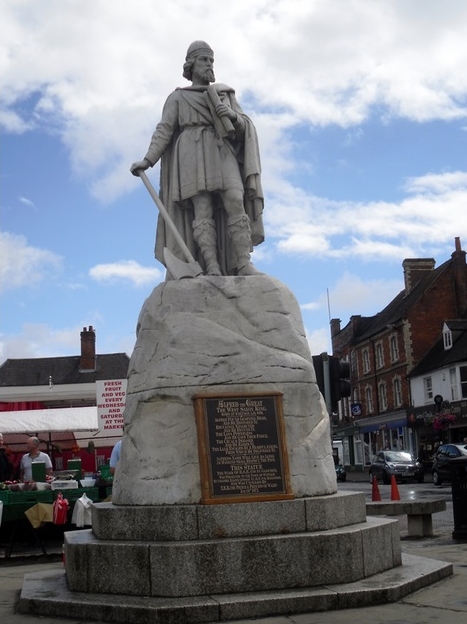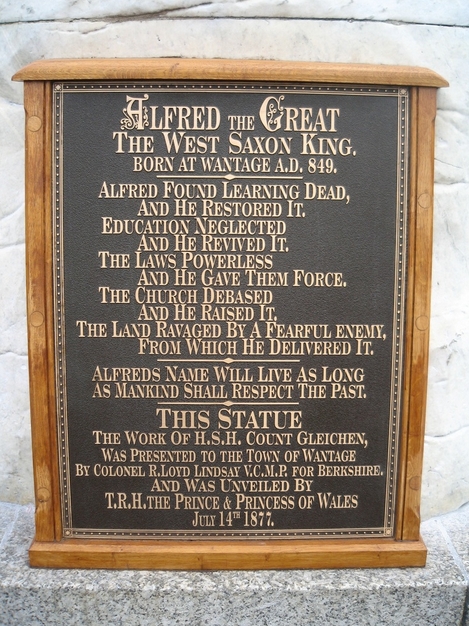Editor’s Note: This is the twelfth chapter of Alfred the Great, by Jacob Abbot (published 1872).
XII. The Close of Life
It was twelve or fifteen years after Alfred’s restoration to his kingdom, by means of the victory at Edendune, that the great invasion of Hastings occurred. That victory took place in the year 878. It was in the years 893-897 that Hastings and his horde of followers infested the land, and in 900 Alfred died, so that his reign ended, as it had commenced, with protracted and desperate conflicts with the Danes.
Hastings was an old and successful soldier before he came to England. He had led a wild life for many years as a sea king on the German Ocean, performing deeds which in our day entail upon the perpetrator of them the infamy of piracy and murder, but which then entitled the hero of them to a very wide-spread and honorable fame. Afterward Hastings landed upon the Continent, and pursued, for a long time, a glorious career of victory and plunder in France. In these enterprises, the tide, indeed, sometimes turned against him. On one occasion, for instance, he found himself obliged to give way before his enemies, and he retreated to a church, which he seized and fortified, making it his castle until a more favorable aspect of his affairs enabled him to issue forth from this retreat and take the field again. Still he was generally very successful in his enterprises; his terrible ferocity, and that of his savage followers, were dreaded in every part of the civilized world.

Hastings had made one previous invasion of England; but Guthrum, faithful to his covenants with Alfred, repulsed him. But Guthrum was now dead, and Alfred had to contend against his formidable enemy alone.
Hastings selected a point on the southern coast of England for his landing. Guthrum’s Danes still continued to occupy the eastern part of England, and Hastings went round on the southern coast until he got beyond their boundaries, as if he wished to avoid doing anything directly to awaken their hostility. Guthrum himself, while he lived, had evinced a determination to oppose Hastings’s plans of invasion. Hastings did not know, now that Guthrum was dead, whether his successors would oppose him or not. He determined, at all events to respect their territory, and so he passed along on the southern shore of England till he was beyond their limits, and then prepared to land.
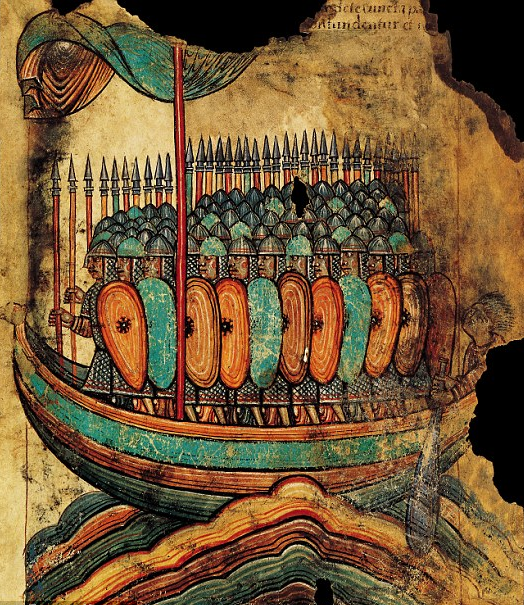
He had assembled a large force of his own, and he was joined, in addition to them, by many adventurers who came out to attach themselves to his expedition from the bays, and islands, and harbors which he passed on his way. His fleet amounted at least to two hundred and fifty vessels. They arrived, at length, at a part of the coast where there extends a vast tract of low and swampy land, which was then a wild and dismal morass. This tract, which is known in modern times by the name of the Romney Marshes, is of enormous extent, containing, as it does, fifty thousand acres. It is now reclaimed, and is defended by a broad and well-constructed dike from the inroads of the sea. In Hastings’s time it was a vast waste of bogs and mire, utterly impassable except by means of a river, which, meandering sluggishly through the tangled wilderness of weeds and bushes in a deep black stream, found an outlet at last into the sea.
Hastings took his vessels into this river, and, following its turnings for some miles, he conducted them at last to a place where he found more solid ground to land upon. But this ground, though solid, was almost as wild and solitary as the morass. It was a forest of vast extent, which showed no signs of human occupancy, except that the peasants who lived in the surrounding regions had come down to the lowest point accessible, and were building a rude fortification there. Hastings attacked them and drove them away. Then, advancing a little further, until he found an advantageous position, he built a strong fortress himself and established his army within its lines.
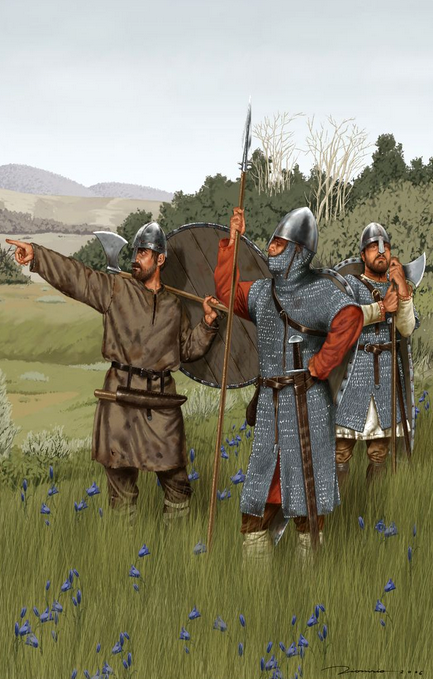
His next measure was to land another force near the mouth of the Thames, and bring them into the country, until he found a strong position where he could intrench and fortify the second division as he had done the first. These two positions were but a short distance from each other. He made them the combined center of his operations, going from them in all directions in plundering excursions. Alfred soon raised an army and advanced to attack him; and these operations were the commencement of a long and tedious war.
A detailed description of the events of this war, the marches and countermarches, the battles and sieges, the various success, first of one party and then of the other, given historically in the order of time, would be as tedious to read as the war itself was to endure. Alfred was very cautious in all his operations, preferring rather to trust to the plan of wearing out the enemy by cutting off their resources and hemming them constantly in, than to incur the risk of great decisive battles. In fact, watchfulness, caution, and delay are generally the policy of the invaded when a powerful force has succeeded in establishing itself among them; while, on the other hand, the hope of invaders lies ordinarily in prompt and decided action. Alfred was well aware of this, and made all his arrangements with a view to cutting off Hastings’s supplies, shutting him up into as narrow a compass as possible, heading him off in all predatory excursions, intercepting all detachments, and thus reducing him at length to the, necessity of surrender.
At one time, soon after the war began, Hastings, true to the character of his nation for treachery and stratagem, pretended that he was ready to surrender, and opened a negotiation for this purpose. He agreed to leave the kingdom if Alfred would allow him to depart peaceably, and also, which was a point of great importance in Alfred’s estimation, to have his two sons baptized. While, however, these negotiations were going on between the two camps, Alfred suddenly found that the main body of Hastings’s army had stolen away in the rear, and were marching off by stealth to another part of the country. The negotiations were, of course, immediately abandoned, and Alfred set off with all his forces in full pursuit. All hopes of peace were given up, and the usual series of sieges, maneuverings, battles, and retreats was resumed again.
On one occasion Alfred succeeded in taking possession of Hastings’s camp, when he had left it in security, as he supposed, to go off for a time by sea on an expedition. Alfred’s soldiers found Hastings’s wife and children in the camp, and took them prisoners. They sent the terrified captives to Alfred, to suffer, as they supposed, the long and cruel confinement or the violent death to which the usages of those days consigned such unhappy prisoners. Alfred baptized the children, and then sent them, with their mother, loaded with presents and proofs of kindness, back to Hastings again.
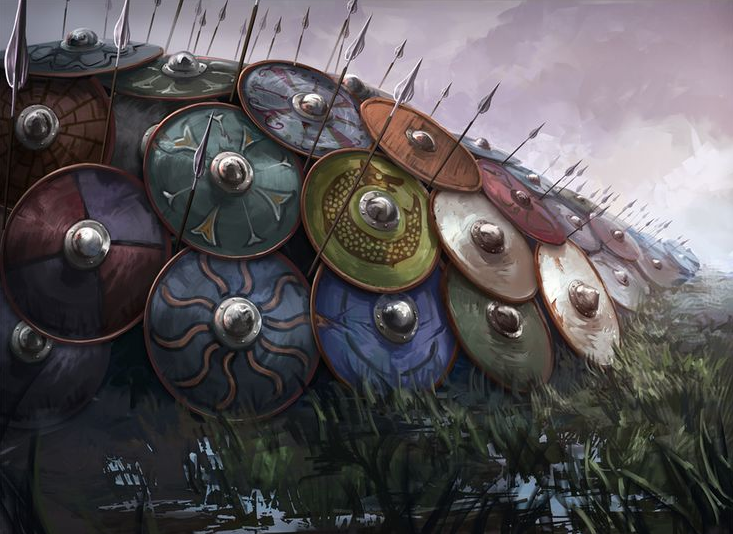
This generosity made no impression upon the heart of Hastings, or, at least, it produced no effect upon his conduct. He continued the war as energetically as ever. Months passed away and new reinforcements arrived, until at length he felt strong enough to undertake an excursion into the very heart of the country. He moved on for a time with triumphant success; but this very success was soon the means of turning the current against him again. It aroused the whole country through which he was passing. The inhabitants flocked to arms. They assembled at every rallying point, and, drawing up on all sides nearer and nearer to Hastings’s army, they finally stopped his march, and forced him to call all his forces in, and intrench himself in the first place of retreat that he could find. Thus his very success was the means of turning his good fortune into disaster.
And then, in the same way, the success of Alfred and the Saxons soon brought disaster upon them too, in their turn; for, after succeeding in shutting Hastings closely in, and cutting off his supplies of food, they maintained their watch and ward over their imprisoned enemies so closely as to reduce them to extreme distress—a distress and suffering which they thought would end in their complete and absolute submission. Instead of ending thus, however, it aroused them to desperation. Under the influence of the frenzy which such hopeless sufferings produce in characters like theirs, they burst out one day from the place of their confinement, and, after a terrible conflict, which choked up a river which they had to pass with dead bodies and dyed its waters with blood, the great body of the starving desperadoes, made their escape, and, in a wild and furious excitement, half a triumph and half a retreat, they went back to the eastern coast of the island, where they found secure places of refuge to receive them.
In the course of the subsequent campaigns, a party of the Danes came up the River Thames with a fleet of their vessels, and an account is given by some of the ancient historians of a measure which Alfred resorted to to entrap them, which would seem to be scarcely credible. The account is, that he altered the course of the river by digging new channels for it, so as to leave the vessels all aground, when, of course, they became helpless, and fell an easy prey, to the attacks of their enemies. This is, at least, a very improbable statement, for a river like the Thames occupies always the lowest channel of the land through which it passes to the sea. Besides, such a river, in order that it should be possible for vessels to ascend it from the ocean, must have the surface of its water very near the level of the surface of the ocean. There can, therefore be no place to which such waters could be drawn off, unless into a valley below the level of the sea. All such valleys, whenever they exist in the interior of a country, necessarily get filled with water from brooks and rains; and so become lakes or inland seas. It is probable, therefore, that it was some other operation which Alfred performed to imprison the hostile vessels in the river, more possible in its own nature than the drawing off of the waters of the Thames from their ancient bed.
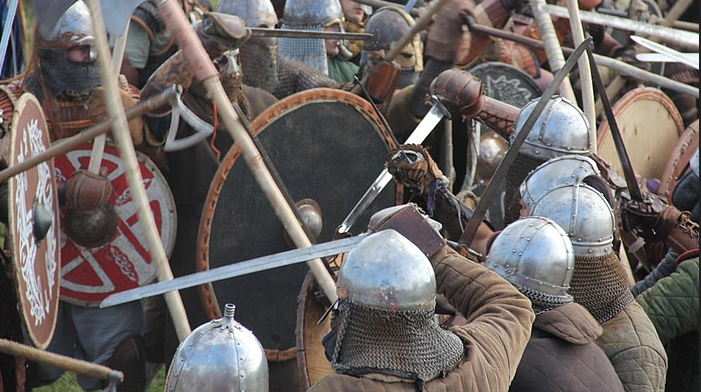
Year after year passed on, and, though neither the Saxons nor the Danes gained any very permanent and decisive victories, the invaders were gradually losing ground, being driven from one intrenchment and one stronghold to another, until, at last, their only places of refuge were their ships, and the harbors along the margin of the sea. Alfred followed on and occupied the country as fast as the enemy was driven away; and when, at last, they began to seek refuge in their ships, he advanced to the shore, and began to form plans for building ships, and manning and equipping a fleet, to pursue his retiring enemies upon their own element. In this undertaking, he proceeded in the same calm, deliberate, and effectual manner, as in all his preceding measures. He built his vessels with great care. He made them twice as long as those of the Danes, and planned them so as to make them more steady, more safe, and capable of carrying a crew of rowers so numerous as to be more active and swift than the vessels of the enemy.
When these naval preparations were made, Alfred began to look out for an object of attack on which he could put their efficiency to the test. He soon heard of a fleet of the Northmen’s vessels on the coast of the Isle of Wight, and he sent a fleet of his own ships to attack them. He charged the commander of this fleet to be sparing of life, but to capture the ships and take the men, bringing as many as possible to him unharmed.
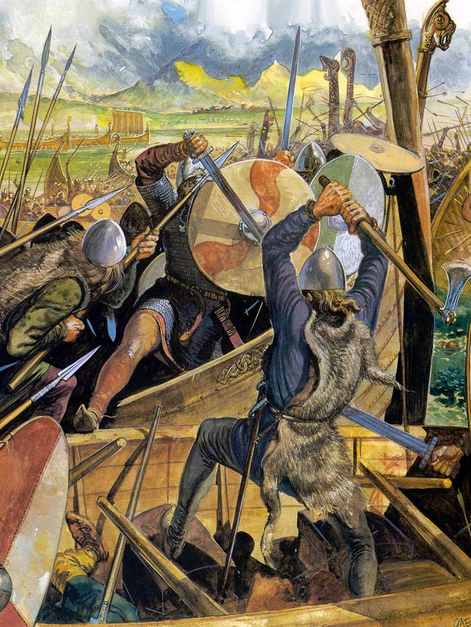
There were nine of the English vessels, and when they reached the Isle of Wight they found six vessels of the Danes in a harbor there. Three of these Danish vessels were afloat, and came out boldly to attack Alfred’s armament. The other three were upon the shore, where they had been left by the tide, and were, of course, disabled and defenseless until the water should rise and float them again. Under these circumstances, it would seem that the victory for Alfred’s fleet would have been easy and sure; and at first the result was, in fact, in Alfred’s favor. Of the three ships that came out to meet him, two were captured, and one escaped, with only five men left on board of it alive. The Saxon ships, after thus disposing of the three living and moving enemies, pushed boldly into the harbor to attack those which were lying lifeless on the sands. They found, however, that, though successful in the encounter with the active and the powerful, they were destined to disaster and defeat in approaching the defenseless and weak. They got aground themselves in approaching the shoals on which the vessels of their enemies were lying. The tide receded and left three of the vessels on the sands, and kept the rest so separated and so embarrassed by the difficulties and dangers of their situation as to expose the whole force to the most imminent danger. There was a fierce contest in boats and on the shore. Both parties suffered very severely; and, finally, the Danes, getting first released, made their escape and put to sea.
Notwithstanding this partial discomfiture, Alfred soon succeeded in driving the ships of the Danes off his coast, and in thus completing the deliverance of his country. Hastings himself went to France, where he spent the remainder of his days in some territories which he had previously conquered, enjoying, while he continued to live, and for many ages afterward, a very extended and very honorable fame. Such exploits as those which he had performed conferred, in those days, upon the hero who performed them, a very high distinction, the luster of which seems not to have been at all tarnished in the opinions of mankind by any ideas of the violence and wrong which the commission of such deeds involved.

Alfred’s dominions were now left once more in peace, and he himself resumed again his former avocations. But a very short period of his life, however, now remained. Hastings was finally expelled from England about 897. In 900 or 901 Alfred died. The interval was spent in the same earnest and devoted efforts to promote the welfare and prosperity of his kingdom that his life had exhibited before the war. He was engaged diligently and industriously in repairing injuries, redressing grievances, and rectifying every thing that was wrong. He exacted rigid impartiality in all the courts of justice; he held public servants of every rank and station to a strict accountability; and in all the colleges, and monasteries, and ecclesiastical establishments of every kind, he corrected all abuses, and enforced a rigid discipline, faithfully extirpating from every lurking place all semblance of immorality or vice. He did these things, too, with so much kindness and consideration for all concerned, and was actuated in all he did so unquestionably by an honest and sincere desire to fulfill his duty to his people and to God, that nobody opposed him. The good considered him their champion, the indifferent readily caught a portion of his spirit and wished him success, while the wicked were silenced if they were not changed.
Alfred’s children had grown up to maturity, and seemed to inherit, in some degree, their father’s character. He had a daughter, named Æthelfleda, who was married to a prince of Mercia, and who was famed all over England for the superiority of her mental powers, her accomplishments, and her moral worth. The name of his oldest son was Edward; he was to succeed Alfred on the throne, and it was a source now of great satisfaction to the king to find this son emulating his virtues, and preparing for an honorable and prosperous reign. Alfred had warning, in the progress of his disease, of the approach of his end. When he found that the time was near at hand, he called his son Edward to his side, and gave him these his farewell counsels; which express in few words the principles and motives by which his own life had been so fully governed.
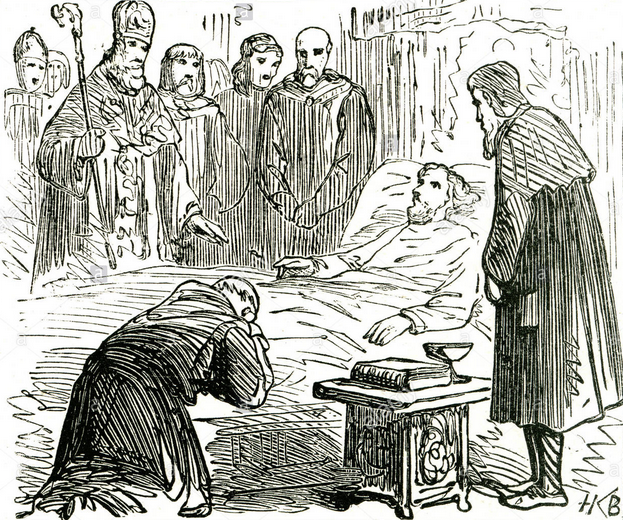
“Thou, my dear son, set thee now beside me, and I will deliver thee true instructions. I feel that my hour is coming. My strength is gone; my countenance is wasted and pale. My days are almost ended. We must now part. I go to another world, and thou art to be left alone in the possession of all that I have thus far held. I pray thee, my dear child, to be a father to thy people. Be the children’s father and the widow’s friend. Comfort the poor, protect and shelter the weak, and, with all thy might, right that which is wrong. And, my son, govern thyself by law. Then shall the Lord love thee, and God himself shall be thy reward. Call thou upon him to advise thee in all thy need, and he shall help thee to compass all thy desires.”
Alfred was fifty-two years of age when he died. His death was universally lamented. The body was interred in the great cathedral at Winchester. The kingdom passed peacefully and prosperously to his son, and the arrangements which Alfred had spent his life in framing and carrying into effect, soon began to workout their happy results. The constructions which he founded stand to the present day, strengthened and extended rather than impaired by the hand of time; and his memory, as their founder, will be honored as long as any remembrance of the past shall endure among the minds of men.
